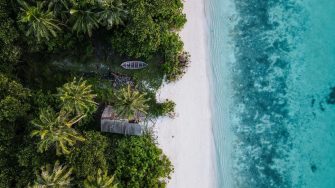Safeguarding our seas: The role of natural capital accounting in securing the future of Maldives' marine ecosystems and blue economy
Natural capital accounting will be an essential tool for sustainable development in the Maldives' blue economy.
Natural capital accounting will be an essential tool for sustainable development in the Maldives' blue economy.

As an archipelago of 1,192 low-lying coral islands, the Republic of the Maldives is a recognised marine hotspot, welcoming 1.6 million tourists annually to enjoy its natural beauty. In the Maldives, coral reefs, beaches, and marine life are some of its most valuable natural assets, providing economic benefits through fisheries, tourism and shoreline protection. These marine and coastal ecosystems, however, are increasingly at risk from pollution, overfishing, climate change and habitat destruction.
Through a new project, the Government of the Maldives are looking to improve the health of these “natural assets” through natural capital accounting to ensure the long-term economic, social, and environmental viability of the Maldives' blue economy.
Natural capital accounting describes efforts to use an accounting framework to systematically measure and report on the state or ‘health’ of natural capital and the contributions these assets provide society and the economy. Natural capital accounting is increasingly recognized as a critical tool for measuring the importance of nature to guide the sustainable development of the blue economy. By quantifying these benefits in monetary terms, natural capital accounting can help decision-makers understand the trade-offs and impacts of different development scenarios and policies on the environment and human well-being. For example, by understanding and valuing the benefits of coral reefs, policymakers can identify and prioritise the most impactful investments in coral reef conservation and restoration programs. This could focus on improving water quality and reducing the impacts of overfishing or other activities that lead to the long-term recovery and resilience of the reefs.
The Maldives’ Enhancing National Development through Environmentally Resilient Islands project aims to strengthen the management of Maldives' coastal and marine ecosystems, build resilience to climate change, and promote sustainable livelihoods for coastal communities. This project is a joint initiative of the Maldivian government, UNDP, and the Global Environment Facility. A component of the project is to enhance capacity for natural capital accounting (utilising the System of Environmental-Economic Accounting: Ecosystem Accounting (SEEA EA) methodology), through a case study of Laamu Atoll, an ecologically sensitive and economically important area in southern Maldives. As Secretariat to the Global Ocean Accounts Partnership (GOAP), the University of New South Wales Sustainable Development Reform Hub has been supporting this initiative by piloting the use of the SEEA EA framework within Laamu Atoll.
While there are many potential applications within Laamu Atoll, tourism, seagrass restoration, and finance applications provide important use cases.
Natural capital accounting will be an essential tool for sustainable development in the Maldives' blue economy. By valuing the benefits of ecosystems and understanding the trade-offs of development policies, decision-makers can develop effective strategies to promote the sustainable use of natural resources. Projects like the piloting of SEEA Ecosystem Accounting within Laamu Atoll can be adapted and implemented in other coastal and marine regions to further enhance the management of these ecosystems and provide lessons to apply a natural capital accounting approach across Small Island Developing States. This can lead to more sustainable tourism practices, ensuring the impact of loan agreements, and protecting biodiversity. Natural capital accounting can help measure progress towards sustainable ocean development and promote the long-term sustainability of the Maldives' blue economy while protecting its natural resources for future generations.